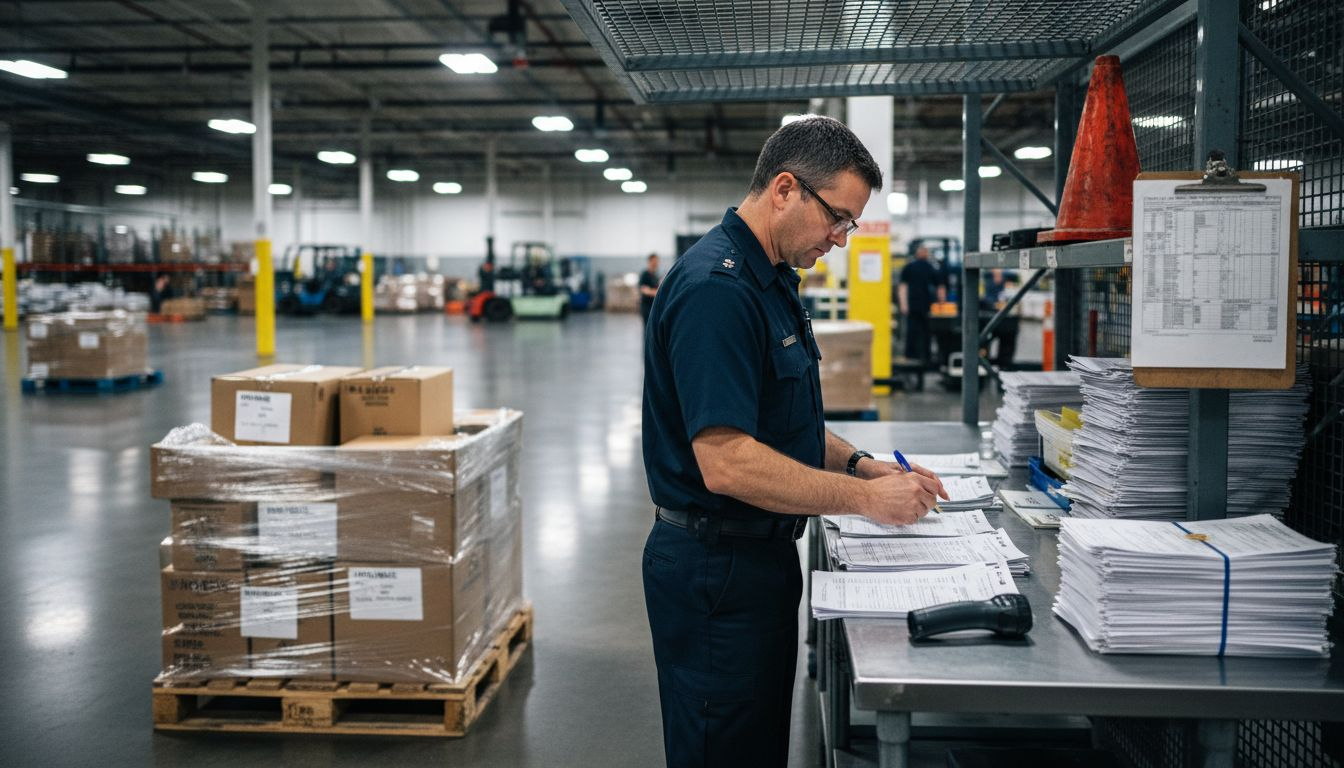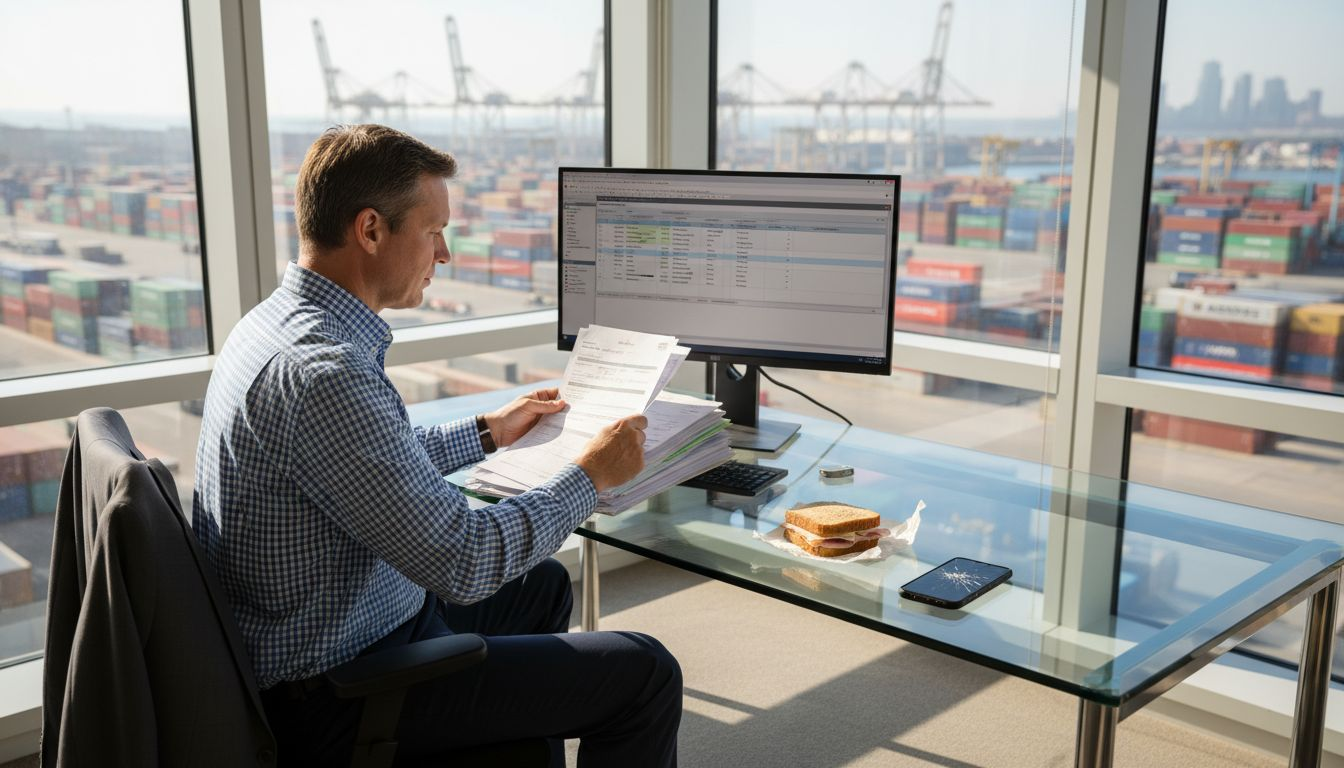International shipping can feel like a maze for many american businesses with more than 90 percent of global trade passing through customs checks. Understanding each step matters because a single mistake can cause unexpected delays, extra costs, or even penalties. Learning how experienced customs brokers, careful documentation, and new technology help to simplify this process will empower your business to navigate international regulations with confidence and keep your shipments moving smoothly.
Table of Contents
- Understand The Role Of A Customs Broker
- Gather And Prepare Accurate Shipping Documents
- Comply With U.S. Customs Regulations
- Classify Goods With Correct Hs Codes
- Use Technology For Tracking And Compliance
- Ensure Proper Duty And Tax Payment
- Choose The Right Customs Brokerage Partner
Quick Summary
| Takeaway | Explanation |
|---|---|
| 1. Understand customs brokers’ roles | Customs brokers facilitate international trade by ensuring compliance and managing logistics effectively. They are essential for navigating regulations. |
| 2. Prepare accurate shipping documents | Precision in documentation is critical to avoid delays and legal issues. Maintain a checklist to ensure all documents are complete and correct. |
| 3. Comply with U.S. customs regulations | Stay updated on customs regulations to avoid penalties. Regular audits can help identify and fix compliance gaps proactively. |
| 4. Use technology for tracking | Implement digital tools for enhanced shipment tracking and compliance monitoring. This improves efficiency and reduces manual errors. |
| 5. Choose the right customs broker | Selecting a knowledgeable customs broker is vital. Look for expertise, technology capability, and industry understanding to streamline operations. |
1. Understand the Role of a Customs Broker
A customs broker is your critical partner in navigating the complex world of international shipping and trade regulations. These licensed professionals serve as essential intermediaries between importers and government agencies, ensuring smooth and compliant cross border transactions.
Customs brokers are officially licensed by U.S. Customs and Border Protection (CBP) to help importers and exporters meet federal requirements for international shipments U.S. Customs and Border Protection. Their core responsibilities extend far beyond simple paperwork filing they are strategic experts who manage intricate logistics of moving products across international borders.
Key Responsibilities of a Customs Broker:
- Submit necessary documentation to government agencies
- Calculate and pay appropriate import duties and taxes
- Classify products according to complex international trade regulations
- Ensure full compliance with import and export laws
- Track shipments and manage customs clearance processes
Think of a customs broker as your personal guide through the maze of international trade regulations. They possess deep knowledge about entry procedures, admissibility requirements, product classification, and precise valuation methods. By leveraging their expertise, businesses can avoid costly delays, penalties, and regulatory complications that often plague inexperienced importers.
Working with a skilled customs broker means transforming a potentially stressful international shipping experience into a streamlined, efficient process. Their specialized knowledge helps you minimize risks, reduce financial uncertainties, and maintain smooth operational continuity for your global trade activities.
For a comprehensive breakdown of how customs brokers differ from other logistics professionals, see our guide on understanding customs brokers versus freight forwarders.
2. Gather and Prepare Accurate Shipping Documents
Accurate shipping documentation serves as the critical backbone of successful international trade. Without precise paperwork, your shipments risk significant delays, financial penalties, and potential legal complications.
Customs brokers play a pivotal role in tracking and preparing required international shipping documents Bureau of Labor Statistics. Their expertise ensures that every document submitted meets stringent regulatory requirements and provides comprehensive details about the shipment.
Essential Shipping Documents to Prepare:
- Commercial Invoice
- Bill of Lading
- Packing List
- Certificate of Origin
- Export License
- Insurance Certificate
When gathering shipping documents, precision is paramount. Each document must contain accurate information about the shipment contents, value, weight, and destination. Even minor errors can trigger customs inspections, causing substantial shipping delays and potentially incurring additional fees.
To streamline your documentation process, develop a systematic checklist that verifies the completeness and accuracy of each required document. Digital documentation tools can help minimize human error and ensure consistent record keeping. Maintaining organized and meticulously prepared paperwork demonstrates professionalism and significantly reduces the risk of customs clearance issues.
For comprehensive guidance on mastering export documentation, check out our master export documentation guide. Proper preparation not only expedites your shipping process but also establishes your business as a reliable international trade partner.
3. Comply with U.S. Customs Regulations
Navigating the complex landscape of U.S. customs regulations requires meticulous attention to detail and proactive compliance strategies. Businesses engaged in international trade must understand and adhere to federal guidelines to avoid costly penalties and shipping disruptions.
According to the Bureau of Labor Statistics, customs brokers play a critical role in keeping businesses informed about changing international trade laws Bureau of Labor Statistics. Their expertise helps importers and exporters stay current with evolving regulatory requirements.
Key Areas of Customs Regulation Compliance:
- Product classification and tariff codes
- Import and export licensing requirements
- Valuation and duty calculation
- Restricted and prohibited goods regulations
- Security filing and documentation standards
Compliance begins with comprehensive understanding of U.S. Customs and Border Protection (CBP) regulations. Every shipment must meet specific entry procedures, admissibility requirements, and classification standards. This means accurately determining product origins, calculating appropriate duties, and maintaining transparent documentation.
To mitigate risks, businesses should invest in ongoing training and leverage professional customs brokerage services. Regular audits of your import export processes can help identify potential compliance gaps before they become problematic.
For a deeper understanding of specific customs entry requirements, explore our guide on understanding customs entry types. Proactive compliance is not just about avoiding penalties it is about establishing your business as a reliable and professional international trade partner.
4. Classify Goods with Correct HS Codes
Harmonized System (HS) codes are the universal language of international trade classification. These standardized numeric codes determine how products are identified, taxed, and moved across global borders with precision and clarity.
According to the Bureau of Labor Statistics, customs brokers play a critical role in reviewing merchandise classification and determining potential special tariff qualifications Bureau of Labor Statistics. Understanding and applying correct HS codes can significantly impact your import export costs and compliance.
Critical Elements of HS Code Classification:
- Product composition and materials
- Intended use of the product
- Specific technical characteristics
- Manufacturing process
- International trade regulations
Each HS code consists of six digits that provide increasingly specific information about a product. The first two digits represent the broader product category, the next two narrow the classification further, and the final two digits offer the most granular description. Incorrect classification can result in substantial financial penalties, delayed shipments, or potential legal complications.
To ensure accurate classification, businesses should maintain detailed product documentation, consult with experienced customs brokers, and stay updated on international trade classification guidelines. Investing time in understanding HS codes can lead to significant cost savings and smoother international shipping processes.
For comprehensive guidance on navigating complex classification challenges, explore our tutorial on understanding customs entry types. Precise classification is not just a regulatory requirement it is a strategic approach to international trade management.
5. Use Technology for Tracking and Compliance
In the fast paced world of international trade, technology has transformed customs brokerage from a paperwork driven process to a dynamic real time tracking and compliance system. Modern digital tools provide unprecedented visibility and control over global shipping operations.
According to the Bureau of Labor Statistics, customs brokers can now complete and submit required forms electronically, enabling remote filing for customs entry and exit across the United States Bureau of Labor Statistics. This technological advancement dramatically improves efficiency and accuracy in international trade management.
Key Technological Tools for Customs Compliance:
- Real time shipment tracking systems
- Digital customs documentation platforms
- Automated compliance screening software
- Cloud based logistics management solutions
- Electronic data interchange (EDI) systems
Technology enables businesses to monitor shipments with unprecedented precision. Advanced tracking systems provide instant updates on cargo location, estimated arrival times, and potential customs clearance issues. Automated compliance screening can rapidly identify potential regulatory risks before they become problematic.
Implementing robust technological solutions requires strategic investment and ongoing training. Businesses should prioritize platforms that integrate seamlessly with existing logistics workflows and provide comprehensive reporting capabilities.
To explore cutting edge approaches to international shipping technology, check out our importer security filing tips. Embracing digital transformation is no longer optional it is a fundamental requirement for competitive international trade operations.
6. Ensure Proper Duty and Tax Payment
Duty and tax payments represent a critical financial component of international trade that can significantly impact your business profitability. Understanding and managing these obligations efficiently is essential for maintaining smooth customs clearance and avoiding potential financial penalties.
According to the Bureau of Labor Statistics, customs brokers play a crucial role in managing duty payments, which are typically required within 10 days of merchandise release Bureau of Labor Statistics. They can facilitate payments either directly on behalf of clients or by authorizing payments from the client’s designated accounts.
Key Considerations for Duty and Tax Management:
- Accurate product valuation
- Correct classification of goods
- Understanding applicable tariff rates
- Timely payment submission
- Maintaining comprehensive financial records
Proper duty and tax management requires a strategic approach that combines precise documentation, thorough understanding of current trade regulations, and proactive financial planning. Businesses must stay informed about potential changes in tariff structures and international trade agreements that could impact their financial obligations.
To mitigate risks, companies should develop robust internal processes for tracking and managing duty payments. This includes maintaining detailed records, understanding the specific requirements for different product categories, and establishing clear communication channels with customs brokers.
For a comprehensive walkthrough of navigating customs duty payments, explore our step by step guide on paying customs duties. Effective financial management in international trade is not just about compliance it is about strategic cost control and maintaining competitive advantage.
7. Choose the Right Customs Brokerage Partner
Selecting the ideal customs brokerage partner can mean the difference between smooth international trade operations and costly regulatory complications. Your customs broker serves as a critical strategic ally in navigating complex global shipping landscapes.
According to the National Customs Brokers and Forwarders Association of America, customs brokers are licensed and regulated by U.S. Customs and Border Protection to assist importers and exporters in meeting federal requirements National Customs Brokers and Forwarders Association. While hiring a customs broker is not legally mandatory, their expertise can be invaluable in managing intricate international trade processes.
Key Factors in Selecting a Customs Brokerage Partner:
- Industry specific expertise
- Technological capabilities
- Comprehensive compliance knowledge
- Global network and connections
- Transparent communication practices
A strategic customs broker does more than file paperwork. They provide proactive guidance, help minimize financial risks, and offer insights into evolving international trade regulations. Look for partners who demonstrate deep understanding of your specific industry, proven track records of successful shipments, and robust technological infrastructure.
When evaluating potential customs brokerage partners, request detailed information about their experience, ask for client references, and assess their technological capabilities. A sophisticated broker will view your relationship as a partnership, not just a transactional service.
To gain deeper insights into making an informed selection, explore our comprehensive guide about customs brokers. The right partnership can transform your international trade operations from challenging to seamless.
Below is a comprehensive table summarizing the key responsibilities, processes, and benefits of engaging with a customs broker as discussed throughout the article.
| Aspect | Description | Benefits/Outcomes |
|---|---|---|
| Role of a Customs Broker | Licensed professionals managing logistics, documentation, and compliance for international shipping. | Ensures smooth transaction, avoids delays and penalties. |
| Shipping Documentation | Preparing crucial documents like invoices, packing lists, and certificates. | Reduces risk of delays and legal complications. |
| U.S. Customs Compliance | Adhering to regulations on product classification, valuation, and licensing. | Avoids costly penalties and disruptions. |
| HS Code Classification | Using standardized codes to identify and tax products accurately. | Prevents legal issues and unexpected costs. |
| Technology in Trade | Utilizing tools like digital documentation and real-time tracking. | Increases efficiency and accuracy in operations. |
| Duty and Tax Management | Calculating and paying import duties correctly and timely. | Maintains profitability and avoids financial penalties. |
| Choosing a Broker | Finding a partner with expertise, tech capabilities, and compliance knowledge. | Smooths trade operations and mitigates risks. |
Take Control of Your Customs Brokerage Challenges with Proven Expertise
Mastering customs brokerage demands precision in documentation classification, compliance with evolving regulations, and timely duty payments. If navigating these complexities feels overwhelming or you want to eliminate costly delays and financial risks, you are not alone. Businesses striving for seamless international trade share these challenges and require a trusted partner with deep knowledge and cutting-edge tools.
At Worldwide Express, Inc., we specialize in delivering tailored customs brokerage services backed by decades of industry experience and a global network. We help you manage HS code classification, ensure regulatory compliance, and handle real-time shipment tracking so you stay ahead with confidence and efficiency. Explore our expert resources and solutions to transform your import/export operations into a smooth, cost-effective process.

Ready to master customs brokerage and take your global shipments to the next level? Visit our Uncategorized – Worldwide Express, Inc. page to learn how our comprehensive international shipping solutions can empower your business. Discover more about our services and start optimizing your customs clearance today at Worldwide Express. Every moment counts in global trade, so do not wait to secure your competitive advantage.
Frequently Asked Questions
What is the role of a customs broker?
A customs broker helps businesses navigate international shipping and trade regulations. They submit required documentation, ensure compliance with laws, and manage customs clearance processes to streamline cross-border transactions.
How can I ensure my shipping documents are accurate?
To ensure accurate shipping documents, develop a systematic checklist that verifies each required document’s completeness and accuracy. This may include items like commercial invoices and packing lists to prevent customs delays.
What are HS codes and why are they important?
HS codes are standardized numeric codes used for classifying goods in international trade. Ensuring accurate classification with the correct HS code can prevent financial penalties and delays in the shipping process.
What technology can I use to improve my customs compliance?
Utilize digital customs documentation platforms and real-time shipment tracking systems to enhance your compliance and tracking. Implementing these technologies can improve efficiency, reduce errors, and help you stay informed about your shipments.
How do I choose the right customs brokerage partner?
Look for a customs brokerage partner with industry-specific expertise and a strong technological infrastructure. Assess their experience and communication practices to ensure they align with your business’s international trade needs.
What steps should I take to manage duty and tax payments effectively?
To manage duty and tax payments effectively, maintain accurate product valuation and understand your obligations regarding tariff rates. Set up a clear tracking system to ensure timely payments, reducing the risk of penalties.
Recommended
- 7 Essential FAQs About Customs Brokers for Importers – Worldwide Express, Inc.
- Understanding Customs Broker Near Me: What You Need to Know – Worldwide Express, Inc.
- Understanding the Role of a Customs Import Broker – Worldwide Express, Inc.
- Master International Freight Shipping for Successful Trade – Worldwide Express, Inc.






